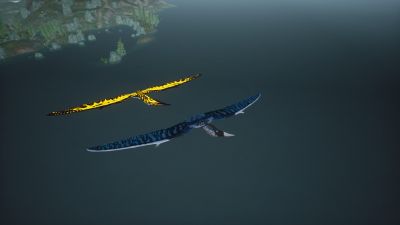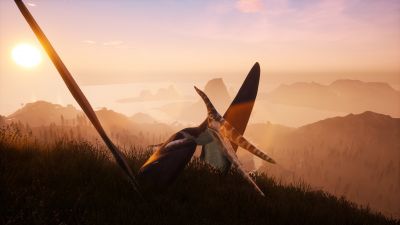Difference between revisions of "Flying Creatures"
m (Minor formatting change) |
|||
| (2 intermediate revisions by 2 users not shown) | |||
| Line 1: | Line 1: | ||
[[File:Pterafly.jpg|right|thumb|400px|border|Pteranodon]] | [[File:Pterafly.jpg|right|thumb|400px|border|Pteranodon]] | ||
| − | Beasts of Bermuda contains currently two creatures | + | Flying creatures take to the skies, capable of staying airborne for extended periods of time. Beasts of Bermuda contains currently two flying creatures: the [[Pteranodon]] and [[Tropeognathus]] (for a list of other likely and discussed flyer additions, please see [[Main Page|this page]]). |
| − | |||
| − | |||
| − | |||
| − | |||
| − | |||
| − | |||
== Takeoff == | == Takeoff == | ||
| − | In order to take off, a player must press the spacebar button. If the player is taking off in a location surrounded by obstructions such as rocks or trees, it is highly likely they will crash into these objects and end up back on the ground again. | + | In order to take off, a player must press the spacebar button. If the player is taking off in a location surrounded by obstructions such as rocks or trees, it is highly likely they will crash into these objects and end up back on the ground again. Takeoff has no stamina cost on land, but takes 35 [[Stamina|stamina]] for the Tropeognathus if taking off from water. |
| − | == Flight == | + | == Flight == |
| − | The | + | In flight, the player can make sharp maneuvers and turns in all directions. The sharpness of these turns are very tight, and the player can constantly spin in mid-air to theoretically hover in place - a great maneuver for waiting for the opportune strike moment. |
| − | + | When flying straight down, they will accumulate what is referred to as dive boost. Dive boost is a speed boost that becomes progressively greater the longer the player has been diving. This allows flyers to build up to significant speeds. | |
| − | + | Speed dictates the rate at which a flyer can adjust their pitch angle. The faster a player is going, the more difficult it will be for them to adjust their pitch angle. | |
| − | |||
| − | Speed dictates the rate at which a flyer can adjust their pitch angle. | ||
Speed dictates how much damage the [[Pteranodon]] will do with its [[Bite|peck]] attack. It will do a lot more damage if the player has gained significant amounts of dive boost. | Speed dictates how much damage the [[Pteranodon]] will do with its [[Bite|peck]] attack. It will do a lot more damage if the player has gained significant amounts of dive boost. | ||
| − | + | Sprinting while in the sky increases speed. The greater the ascent angle while going upwards, the more rapidly a flyer will consume [[Stamina|stamina]]. Flyers use and regain stamina significantly faster than other animals. | |
| − | |||
| − | Sprinting while in the sky increases speed | ||
== Crashing == | == Crashing == | ||
| Line 33: | Line 23: | ||
[[File:Pterasolo.jpg|right|thumb|400px|border|]] | [[File:Pterasolo.jpg|right|thumb|400px|border|]] | ||
| − | Flying creatures are often fragile. | + | Flying creatures are often fragile. They take injury damage when hit by any source of damage, regardless of whether or not it hits the wing, head, legs, or torso. Hitting obstructions such as walls, cliffs, trees, and rocks while airborne will result in a crash, in which the player loses complete control of their flyer as it falls out of the sky. A crash will result in significant [[Injury|injury damage]]. The faster the player was going upon impact, the more severe the injury and [[Damage|damage]] accrued during the impact. The player will regain control of their flyer once it hits the ground and comes to rest. It is very easy to die from falling, even from a small cliff. |
== Landing == | == Landing == | ||
| − | In order to land safely, the player must be traveling slow enough and close to the ground. | + | In order to land safely, the player must be traveling slow enough and close to the ground, aided by using the Brake button. If they are going to fast or if the place in which they are trying to land is unsuitable for a landing, they will crash instead, taking injury damage or potentially dying. Unsuitable locations are any location in which the slope of the terrain or object is too steep. Trying to land on a nearly vertical cliff face will result in a crash, for example. |
| + | |||
| + | == Trivia == | ||
| + | |||
| + | The Pteranodon's flight was greatly inspired by the Primal Carnage Pteranodon due to its control and capability in a combat scenario. | ||
Latest revision as of 07:30, 22 July 2023
Flying creatures take to the skies, capable of staying airborne for extended periods of time. Beasts of Bermuda contains currently two flying creatures: the Pteranodon and Tropeognathus (for a list of other likely and discussed flyer additions, please see this page).
Contents
Takeoff
In order to take off, a player must press the spacebar button. If the player is taking off in a location surrounded by obstructions such as rocks or trees, it is highly likely they will crash into these objects and end up back on the ground again. Takeoff has no stamina cost on land, but takes 35 stamina for the Tropeognathus if taking off from water.
Flight
In flight, the player can make sharp maneuvers and turns in all directions. The sharpness of these turns are very tight, and the player can constantly spin in mid-air to theoretically hover in place - a great maneuver for waiting for the opportune strike moment.
When flying straight down, they will accumulate what is referred to as dive boost. Dive boost is a speed boost that becomes progressively greater the longer the player has been diving. This allows flyers to build up to significant speeds.
Speed dictates the rate at which a flyer can adjust their pitch angle. The faster a player is going, the more difficult it will be for them to adjust their pitch angle.
Speed dictates how much damage the Pteranodon will do with its peck attack. It will do a lot more damage if the player has gained significant amounts of dive boost.
Sprinting while in the sky increases speed. The greater the ascent angle while going upwards, the more rapidly a flyer will consume stamina. Flyers use and regain stamina significantly faster than other animals.
Crashing
Flying creatures are often fragile. They take injury damage when hit by any source of damage, regardless of whether or not it hits the wing, head, legs, or torso. Hitting obstructions such as walls, cliffs, trees, and rocks while airborne will result in a crash, in which the player loses complete control of their flyer as it falls out of the sky. A crash will result in significant injury damage. The faster the player was going upon impact, the more severe the injury and damage accrued during the impact. The player will regain control of their flyer once it hits the ground and comes to rest. It is very easy to die from falling, even from a small cliff.
Landing
In order to land safely, the player must be traveling slow enough and close to the ground, aided by using the Brake button. If they are going to fast or if the place in which they are trying to land is unsuitable for a landing, they will crash instead, taking injury damage or potentially dying. Unsuitable locations are any location in which the slope of the terrain or object is too steep. Trying to land on a nearly vertical cliff face will result in a crash, for example.
Trivia
The Pteranodon's flight was greatly inspired by the Primal Carnage Pteranodon due to its control and capability in a combat scenario.

